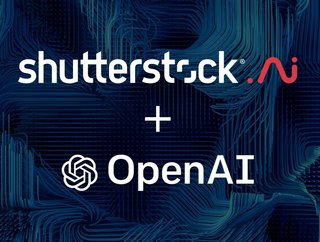OpenAI to use Shutterstock data to help train AI models

Shutterstock has announced an expansion of its partnership with OpenAI which will see the ChatGPT creator use Shutterstock's image, video and music libraries and associated metadata for training its AI models.
As part of this expanded collaboration, the companies said Shutterstock will gain priority access to the latest OpenAI technology and will continue to leverage DALL·E's groundbreaking generative text-to-image capabilities directly into the shutterstock.com platform. In addition to text-to-image generation, the integration will also provide Shutterstock customers with synthetic editing capabilities, allowing them to not just create new content, but also to simply edit and transform any image in the entire Shutterstock library to accelerate ideation and production. Shutterstock and OpenAI will work in collaboration to bring generative AI capabilities to mobile users through Shutterstock's newly acquired GIPHY platform.
"The renewal and significant expansion of our strategic partnership with OpenAI reinforces Shutterstock's commitment to driving AI tech innovation and positions us as the data and distribution partner of choice for industry leaders in generative AI," said Paul Hennessy, CEO of Shutterstock.
Partnership continuing to bring AI advancements to the creative industry
"We're pleased to be able to license Shutterstock's high-quality content library,” Brad Lightcap, COO of OpenAI, added. “This extended collaboration not only enhances the capabilities of our image models but also empowers brands, digital media, and marketing companies to unlock transformative possibilities in content creation and ideation.
“We look forward to bringing the next generation of generative AI capabilities to Shutterstock and GIPHY's vast user base, further revolutionizing the way people express themselves through visual media."
This partnership expansion is the latest in several strategic steps Shutterstock has taken as one of the leading innovators bringing AI advancements to the creative industry. Earlier this year, the company launched its AI Image Generator, a DALL·E-powered groundbreaking tool that empowers users to instantly create customized visuals. Shutterstock was also the first to introduce a Contributor Fund, its pioneering initiative that to date has compensated hundreds of thousands of artists for the role their content IP has played in training Shutterstock's generative technology as well as to compensate them with ongoing royalties tied to licensing activity for newly generated assets.
“In an important effort to protect the IP rights of its artists, photographers, and creators, Shutterstock continues to lead in developing policy and procedures, and employs methods to ensure that usage rights and proper licenses are secured for all featured content -- including AI-generated content,” a Shutterstock statement read at the time.
In addition to OpenAI, Shutterstock has collaborated with industry leaders such as NVIDIA, Meta, LG and others to develop foundational generative AI tools and standards for creators across 3D, images and text.






